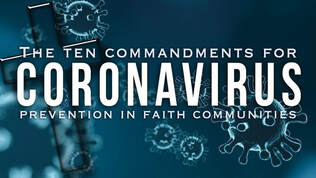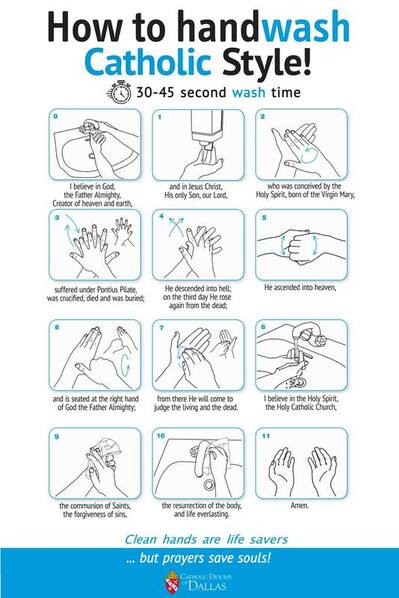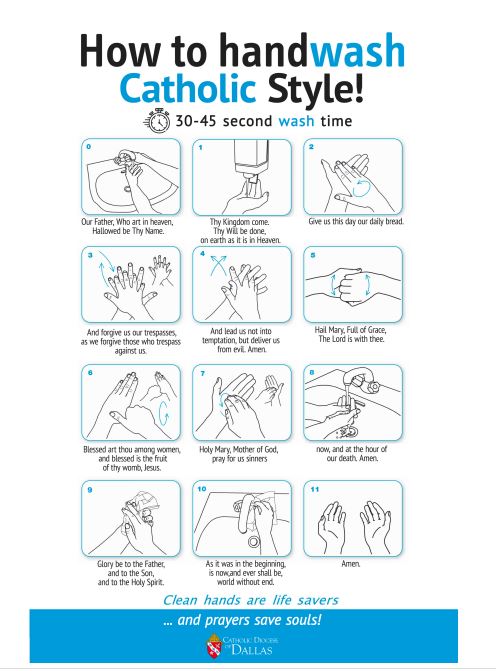
Beginning Monday, March 23, you are invited to join us via Facebook LIVE, for a daily recitation of the Divine Mercy Chaplet and Eucharistic reflection and adoration. For the next several weeks, we will be streaming from the chancery (Mon.-Fri.) from 3-3:30 p.m. CDT.
(click on the title to be taken to the Facebook page)
This moment for prayer and adoration is a reminder that Jesus is always with us, especially in our greatest time of need. Pray along with us from wherever you are, and encourage others to join in.
(click on the title to be taken to the Facebook page)
This moment for prayer and adoration is a reminder that Jesus is always with us, especially in our greatest time of need. Pray along with us from wherever you are, and encourage others to join in.
Niceene Creed Hand Washing |
Our Father, Hail Mary, Glory Be
|
3-17-2020
Latest Coronavirus Measures for the Diocese of Grand Island ... an update from Bishop Hanefeldt:

To all people of faith and good will in the Diocese of Grand Island,
Throughout his public ministry, Jesus often said to people, “It is your faith that has saved you.” As we struggle with what must be done to limit the spread of the coronavirus in this country, I ask you, above all, to pray for an increase in the supernatural gift of faith. Particularly when our concerns, fears and insecurities disturb our peace. Like St. Joseph, let us renew our faith and trust in God, who sent his only begotten Son, to save us.
Yesterday, the Centers for Disease Control and Nebraska Governor Pete Ricketts recommended the cancellation of public assemblies with 10 or more people, including worship services. While this is devastating news, it is vital that we are united in our efforts to contain the spread of this virus. Thus, it is with a heavy heart that I am invoking more stringent measures throughout the Diocese of Grand Island. Effective immediately, and consistent with the Archdiocese of Omaha and the Diocese of Lincoln, all public Masses and other communal celebrations of the Sacraments or other liturgies are temporarily suspended throughout the Diocese of Grand Island. In other words, there will be no public funeral services, weddings, Lenten Penance services, Confirmations, retreats, Parish Missions, or the Chrism Mass until further notice.
While funeral services may not take place, the committal of the body or the cremains at the cemetery should be commended to the Lord with only the closest relatives present, as long as the number of those in attendance is in compliance with civil authorities. Then, at a later date, a Memorial Mass or Service for the deceased may be scheduled.
Weddings ceremonies that are limited to the bride and groom, their two witnesses, and their parents may be celebrated, as long as the number of those in attendance is in compliance with civil authorities. Then, at a later time, a full reception may be scheduled to honor the newlyweds and celebrate with them.
These are very difficult measures because of how important our sacramental life is to us. May these limitations on what is most sacred to us, the freedom of worship, renew our longing for the day when we can again assemble to celebrate the Sacred Liturgy and receive our Lord in Holy Communion.
With the suspension of all public Masses, I ask every priest (health permitting) to celebrate Mass in private each day, praying for all those who are afflicted with the Coronavirus, for those in the medical community who are treating patients and for family members who are providing care at home.
While these measures are unprecedented in our times, there are many ways in which our faith tradition as Catholics can enrich our spiritual lives when we are unable to receive Holy Communion.
Palm Sunday occurs on April 5th this year. As civil authorities continue to assess the situation in our state, I will be providing an update with further direction about the liturgical celebrations for Holy Week and Easter Sunday. Likewise, further details regarding the possibility of livestreaming Masses will be made available as soon as some determination can be made.
Finally, please check regularly the website for the Diocese of Grand Island: www.gidiocese.org for updates and additional information.
Let us invoke the powerful intercession of St. Joseph, Patron of the Universal Church, for his protection upon us all, and his heavenly aid for all who are afflicted with the Coronavirus, and their caregivers.
In Christ, our Hope!
+Joseph G. Hanefeldt
Bishop of Grand Island
Throughout his public ministry, Jesus often said to people, “It is your faith that has saved you.” As we struggle with what must be done to limit the spread of the coronavirus in this country, I ask you, above all, to pray for an increase in the supernatural gift of faith. Particularly when our concerns, fears and insecurities disturb our peace. Like St. Joseph, let us renew our faith and trust in God, who sent his only begotten Son, to save us.
Yesterday, the Centers for Disease Control and Nebraska Governor Pete Ricketts recommended the cancellation of public assemblies with 10 or more people, including worship services. While this is devastating news, it is vital that we are united in our efforts to contain the spread of this virus. Thus, it is with a heavy heart that I am invoking more stringent measures throughout the Diocese of Grand Island. Effective immediately, and consistent with the Archdiocese of Omaha and the Diocese of Lincoln, all public Masses and other communal celebrations of the Sacraments or other liturgies are temporarily suspended throughout the Diocese of Grand Island. In other words, there will be no public funeral services, weddings, Lenten Penance services, Confirmations, retreats, Parish Missions, or the Chrism Mass until further notice.
While funeral services may not take place, the committal of the body or the cremains at the cemetery should be commended to the Lord with only the closest relatives present, as long as the number of those in attendance is in compliance with civil authorities. Then, at a later date, a Memorial Mass or Service for the deceased may be scheduled.
Weddings ceremonies that are limited to the bride and groom, their two witnesses, and their parents may be celebrated, as long as the number of those in attendance is in compliance with civil authorities. Then, at a later time, a full reception may be scheduled to honor the newlyweds and celebrate with them.
These are very difficult measures because of how important our sacramental life is to us. May these limitations on what is most sacred to us, the freedom of worship, renew our longing for the day when we can again assemble to celebrate the Sacred Liturgy and receive our Lord in Holy Communion.
With the suspension of all public Masses, I ask every priest (health permitting) to celebrate Mass in private each day, praying for all those who are afflicted with the Coronavirus, for those in the medical community who are treating patients and for family members who are providing care at home.
While these measures are unprecedented in our times, there are many ways in which our faith tradition as Catholics can enrich our spiritual lives when we are unable to receive Holy Communion.
- While public gatherings for worship are suspended, I ask that our Churches remain open and available daily for private prayer, from sunrise until a reasonable time into the evening. It is my hope that people of faith will come to spend time with our Lord in Eucharistic Adoration, offering him their love and pouring out their heart’s deepest desires with great faith in Him.
- Perhaps you may be able to watch Mass on Television (e.g., on EWTN) or view Sunday Mass livestreamed from somewhere. This is a way of being united, to some degree, with the celebration of the Mass going on throughout the world, and remotely with one another.
- The practice of making a “Spiritual Communion” is a beautiful way to unite ourselves with the Lord as we express our hunger for Eucharistic communion with him. Making a Spiritual Communion is a beautiful expression of our deep longing to ultimately be united with God for eternity. This can be done at any time, and in any place, including from our own homes.
- Utilizing the time you would otherwise be at Sunday Mass to read and reflect upon the Sunday Scripture readings, either as a family or individually, can be deepen our sense of being united with our Lord and with one another.
- Family devotions can also be a way of uniting ourselves within our own homes, to pray the rosary, the Chaplet of Divine Mercy, the Stations of the Cross or other personal devotions.
- Practicing the corporal and spiritual works of mercy can be done by making phone calls to those in our parish communities who live alone, encouraging them, praying with them and perhaps offering to bring them groceries or assist them in other ways.
Palm Sunday occurs on April 5th this year. As civil authorities continue to assess the situation in our state, I will be providing an update with further direction about the liturgical celebrations for Holy Week and Easter Sunday. Likewise, further details regarding the possibility of livestreaming Masses will be made available as soon as some determination can be made.
Finally, please check regularly the website for the Diocese of Grand Island: www.gidiocese.org for updates and additional information.
Let us invoke the powerful intercession of St. Joseph, Patron of the Universal Church, for his protection upon us all, and his heavenly aid for all who are afflicted with the Coronavirus, and their caregivers.
In Christ, our Hope!
+Joseph G. Hanefeldt
Bishop of Grand Island
A letter send out from Bishop Hanefeldt:
Your browser does not support viewing this document. Click here to download the document.
Another bit of Good Advice from a Methodist Minster:

The Ten Commandments for
Coronavirus Prevention
in Faith Communities
By: The Rev. Kevin Murriel
Several weeks ago, my wife and I were watching the news and witnessed the global panic of COVID-19, better known as Coronavirus.
At the time, no known cases had been discovered in the United States.
Coronavirus is now reportedly in 85 countries and 17 states in the U.S.
With the rapid spread of COVID-19, many religious leaders and people of faith are questioning
how this will directly affect their worship and service in the world.
I serve as the senior pastor of one of the largest churches in the Southeast
and we, at our core, are a loving congregation.
Members and guests come from miles around to feel the “Sweet, Sweet Spirit” of
Cascade United Methodist Church. At least 2,000 people visit our church throughout
the week and personal contact is inevitable.
After receiving texts and emails from pastor friends and congregants, the concern is the same: how do we keep the fellowship within our congregations vibrant, while remaining safe, as we deal with coronavirus at least for the foreseeable future?
To help me address this concern, I convened a meeting with several top health professionals
including my friend and Leadership Atlanta classmate, Dr. Sandra Elizabeth Ford who currently
serves as Director of the DeKalb County Board of Health and Interim Director of the Fulton County Board of Health. During this meeting, we discussed best practices for faith communities
to implement to prevent the spread of coronavirus and to calm any fear or anxiety regarding the virus.
Here are the Ten Commandments for
Coronavirus (COVID-19) Prevention in Faith Communities:
1. THOU SHALL NOT PANIC– It’s important that we educate our congregants using facts not myths.
Dr. Robert Murphy, executive director of the Institute for Global Health at Northwestern University’s Feinberg School of Medicine and an infectious diseases professor says, “the one thing we really don’t need is mass hysteria.” “Coronavirus” has been around for years. In humans, coronaviruses infect cells of the upper respiratory and gastrointestinal tract and are responsible for about one third of all common colds. The current strand of coronavirus, COVID-19, has people most concerned because it has been linked to a higher rate of mortality. However, the CDC estimates that so far this season there have been at least 32 million flu illnesses, 310,000 hospitalizations and 18,000 deaths from the flu. The reality is, we should always be cautious during flu season in particular, but coronavirus should not cause us to panic. Health experts suggest that prevention is the best course of action.
2. THOU SHALL CLEAN THY HANDS REGULARLY AND THOROUGHLY–When coronavirus began to spread, I was going through the airport and saw hundreds of people wearing masks. The next day, a major news outlet reported that wearing masks is an ineffective practice for controlling the spread of the coronavirus. The number one recommendation was to wash your hands thoroughly, as often as possible, with soap and warm water for at least twenty seconds. Before shaking hands or engaging in any human contact, we should make sure our hands are clean. The CDC also recommends refraining from touching your eyes or mouth before you have washed your hands.
3. THOU SHALL ENGAGE IN SOCIAL DISTANCING– Faith communities are known for “passing the peace” during worship. This is a designated moment of fellowship which often includes hugging, hand shakes, and even greetings with a kiss. I recommend churches continue to the “pass the peace,” but do it while engaging in social distancing. That is, greet one another by touching elbows, waving, nodding, or some other virtual sign of love while being judicious with human contact. Each person should use their discretion with this practice and should not be offended should someone not want to hug or shake hands as they normally would.
4. THOU SHALL MAKE SANITIZER AVAILABLE– If possible, sanitizer should be made available in as many places around the worship facility as possible. Stations should be intentionally positioned at entrances and exits as well as strategically within the worship space. If you have your own sanitizer, use it as often as you need to during worship. Also, you may want to be a good neighbor and offer sanitizer to others as they have need. Ushers, greeters, etc. should wash their hands thoroughly and also have sanitizer and tissue available for worshippers.
5. THOU SHALL LOVE THY NEIGHBOR AND CARE FOR THYSELF– In Matthew 22:39, Jesus says the second greatest commandment is to “love thy neighbor as thyself.” If you are sick or experiencing cold-like symptoms, please love your neighbor enough to stay home from worship and other activities, and love yourself enough to get well and visit a healthcare professional. This is also important for children and youth.
6. THOU SHALL PUT SIGNS IN RESTROOMS– Placing signs in restrooms reminding people to wash their hands thoroughly, and providing instructions for proper hand-washing can be very effective in coronavirus prevention.
7. THOU SHALL NOT DISCRIMINATE– The new strand of coronavirus (COVID-19) originated in China. Since then, there have been numerous incidents of discrimination towards the Asian community. As people of faith, we should affirm all of God’s people as sacred worth and should denounce this type of evil.
8. THOU SHALL BE CONSIDERATE OF VULNERABLE POPULATIONS– Like any health crisis, there are certain populations more at risk that need our attention and care. Our senior citizens, as well as individuals with co-morbid conditions in our congregations should be considered high on our priority list for care. Make regular wellness calls and visits to seniors within your worship community to ensure they have everything they need. We should be doing this regularly anyway, however, it should especially be done until coronavirus is eradicated.
9. THOU SHALL BE WISE WITH TRANSPORTATION– Faith communities with transportation ministries should take precautionary measures to ensure vehicles are thoroughly cleaned inside and that sanitizer is offered in transit. Faith communities doing outreach should ensure all volunteers sign waivers of liability, and should food be distributed, precautions should be taken to protect those being served. For such precautions, refer to commandment #2.
10. THOU SHALL PRAY– After following every commandment and being as cautious as possible, at our core, we are people who believe in the power of prayer. We should pray for God to heal our land. We should pray for the families already affected by COVID-19. We should pray for faith to continue worshipping and serving. We should pray for our leaders and health professionals working diligently to contain and respond to this virus. We should pray and care for each other.
Remember, it’s about prevention, so don’t panic. This, too, shall pass.
About the writer: The Rev. Dr. Kevin Murriel leads over 7,000 members as the senior pastor of Cascade United Methodist Church in Atlanta, Georgia. He has given us permission to republish this article.
Coronavirus Prevention
in Faith Communities
By: The Rev. Kevin Murriel
Several weeks ago, my wife and I were watching the news and witnessed the global panic of COVID-19, better known as Coronavirus.
At the time, no known cases had been discovered in the United States.
Coronavirus is now reportedly in 85 countries and 17 states in the U.S.
With the rapid spread of COVID-19, many religious leaders and people of faith are questioning
how this will directly affect their worship and service in the world.
I serve as the senior pastor of one of the largest churches in the Southeast
and we, at our core, are a loving congregation.
Members and guests come from miles around to feel the “Sweet, Sweet Spirit” of
Cascade United Methodist Church. At least 2,000 people visit our church throughout
the week and personal contact is inevitable.
After receiving texts and emails from pastor friends and congregants, the concern is the same: how do we keep the fellowship within our congregations vibrant, while remaining safe, as we deal with coronavirus at least for the foreseeable future?
To help me address this concern, I convened a meeting with several top health professionals
including my friend and Leadership Atlanta classmate, Dr. Sandra Elizabeth Ford who currently
serves as Director of the DeKalb County Board of Health and Interim Director of the Fulton County Board of Health. During this meeting, we discussed best practices for faith communities
to implement to prevent the spread of coronavirus and to calm any fear or anxiety regarding the virus.
Here are the Ten Commandments for
Coronavirus (COVID-19) Prevention in Faith Communities:
1. THOU SHALL NOT PANIC– It’s important that we educate our congregants using facts not myths.
Dr. Robert Murphy, executive director of the Institute for Global Health at Northwestern University’s Feinberg School of Medicine and an infectious diseases professor says, “the one thing we really don’t need is mass hysteria.” “Coronavirus” has been around for years. In humans, coronaviruses infect cells of the upper respiratory and gastrointestinal tract and are responsible for about one third of all common colds. The current strand of coronavirus, COVID-19, has people most concerned because it has been linked to a higher rate of mortality. However, the CDC estimates that so far this season there have been at least 32 million flu illnesses, 310,000 hospitalizations and 18,000 deaths from the flu. The reality is, we should always be cautious during flu season in particular, but coronavirus should not cause us to panic. Health experts suggest that prevention is the best course of action.
2. THOU SHALL CLEAN THY HANDS REGULARLY AND THOROUGHLY–When coronavirus began to spread, I was going through the airport and saw hundreds of people wearing masks. The next day, a major news outlet reported that wearing masks is an ineffective practice for controlling the spread of the coronavirus. The number one recommendation was to wash your hands thoroughly, as often as possible, with soap and warm water for at least twenty seconds. Before shaking hands or engaging in any human contact, we should make sure our hands are clean. The CDC also recommends refraining from touching your eyes or mouth before you have washed your hands.
3. THOU SHALL ENGAGE IN SOCIAL DISTANCING– Faith communities are known for “passing the peace” during worship. This is a designated moment of fellowship which often includes hugging, hand shakes, and even greetings with a kiss. I recommend churches continue to the “pass the peace,” but do it while engaging in social distancing. That is, greet one another by touching elbows, waving, nodding, or some other virtual sign of love while being judicious with human contact. Each person should use their discretion with this practice and should not be offended should someone not want to hug or shake hands as they normally would.
4. THOU SHALL MAKE SANITIZER AVAILABLE– If possible, sanitizer should be made available in as many places around the worship facility as possible. Stations should be intentionally positioned at entrances and exits as well as strategically within the worship space. If you have your own sanitizer, use it as often as you need to during worship. Also, you may want to be a good neighbor and offer sanitizer to others as they have need. Ushers, greeters, etc. should wash their hands thoroughly and also have sanitizer and tissue available for worshippers.
5. THOU SHALL LOVE THY NEIGHBOR AND CARE FOR THYSELF– In Matthew 22:39, Jesus says the second greatest commandment is to “love thy neighbor as thyself.” If you are sick or experiencing cold-like symptoms, please love your neighbor enough to stay home from worship and other activities, and love yourself enough to get well and visit a healthcare professional. This is also important for children and youth.
6. THOU SHALL PUT SIGNS IN RESTROOMS– Placing signs in restrooms reminding people to wash their hands thoroughly, and providing instructions for proper hand-washing can be very effective in coronavirus prevention.
7. THOU SHALL NOT DISCRIMINATE– The new strand of coronavirus (COVID-19) originated in China. Since then, there have been numerous incidents of discrimination towards the Asian community. As people of faith, we should affirm all of God’s people as sacred worth and should denounce this type of evil.
8. THOU SHALL BE CONSIDERATE OF VULNERABLE POPULATIONS– Like any health crisis, there are certain populations more at risk that need our attention and care. Our senior citizens, as well as individuals with co-morbid conditions in our congregations should be considered high on our priority list for care. Make regular wellness calls and visits to seniors within your worship community to ensure they have everything they need. We should be doing this regularly anyway, however, it should especially be done until coronavirus is eradicated.
9. THOU SHALL BE WISE WITH TRANSPORTATION– Faith communities with transportation ministries should take precautionary measures to ensure vehicles are thoroughly cleaned inside and that sanitizer is offered in transit. Faith communities doing outreach should ensure all volunteers sign waivers of liability, and should food be distributed, precautions should be taken to protect those being served. For such precautions, refer to commandment #2.
10. THOU SHALL PRAY– After following every commandment and being as cautious as possible, at our core, we are people who believe in the power of prayer. We should pray for God to heal our land. We should pray for the families already affected by COVID-19. We should pray for faith to continue worshipping and serving. We should pray for our leaders and health professionals working diligently to contain and respond to this virus. We should pray and care for each other.
Remember, it’s about prevention, so don’t panic. This, too, shall pass.
About the writer: The Rev. Dr. Kevin Murriel leads over 7,000 members as the senior pastor of Cascade United Methodist Church in Atlanta, Georgia. He has given us permission to republish this article.


